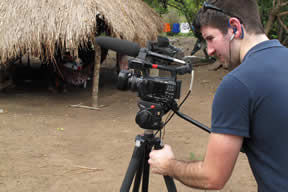Days after a reporting project by University of British Columbia journalism students ran in The New York Times, Brazilian authorities began arresting suspects in the murder of indigenous leader Nisio Gomes.
“This is the kind of impact journalists dream about,” says Peter W. Klein, the director of UBC’s Graduate School of Journalism and co-instructor of the global reporting class.
In February, the UBC reporting class traveled to southern Brazil to investigate resource and territory disputes between farmers and indigenous people. The students interviewed Gomes’ son and nephew about the execution-style attack of the Guarani tribal chief, and their resulting video and story appeared on the New York Times website on June 9.
In the five weeks since these stories, 18 people have reportedly been arrested in connection with the Gomes murder, including the head of a major security firm that protects farmland from Guarani land reclamation efforts.
Klein said there were many indications the Brazilian government did not want this story told, most notably their apprehension by federal police after a meeting with FUNAI, the Brazilian government agency that oversees indigenous affairs.
“The students and I were never in danger, but the experience underscored for all of us that we were clearly touching a nerve,” says Klein.
The UBC project started when student Calyn Shaw heard about Gomes’ murder in November. ”This was a really under-reported story and our goal was to give it the attention it deserves,” says Shaw. “These arrests are a good first step, but hopefully we inspire other news media and Brazil’s government to watch the process closely, to ensure that convictions occur and justice prevails.”
A group of program graduates are still following the story and are building a website dedicated to the issue of land disputes in Brazil, he adds.
Watch the UBC video, entitled “Dying for land”: http://www.internationalreporting.org/landbrazil/dyingforland/. Learn more about the project at: www.internationalreporting.org, www.journalism.ubc.ca and UBC’s newsroom.
View the original UBC media release and find media contacts at the UBC newsroom.
Background
This is the fourth project of UBC’s International Reporting Program, which results from a gift from Alison Lawton and Mindset Social Innovation Foundation.
Previous projects include: Ghana: Digital Dumping Ground, which won the 2010 Emmy Award for Outstanding Magazine Investigative Reporting, Cheap Shrimp: Hidden Costs, a multimedia project for the Globe and Mail, and The Pain Project, which explored the global pain crisis caused by morphine shortages, in partnership with CBS News, Al Jazeera and Global.
The eight students involved in this year’s International Reporting Program come from five different countries — Canada, U.S., India, Pakistan, Poland — making it the most internationally diverse group in the class’ history.
UBC’s Brazil investigation was co-led by UBC Assistant Journalism Prof. David Rummel, a former senior video producer at the New York Times, and Adjunct Prof. Dan McKinney.
